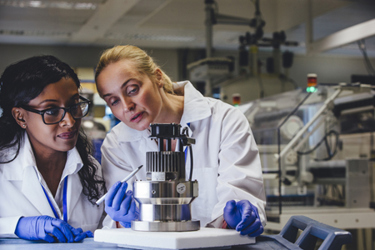Doubling Down On Biopharma's Growing Skills Drought

By Matthew Pillar, Editor, Bioprocess Online

You’d be hard-pressed to find an organization that does more ground-level work for the biopharmaceutical industry, much less one that does it any better, than the National Institute for Innovation in Manufacturing Biopharmaceuticals (NIIMBL). Comprised of a who’s-who consortium of academia and industry, NIIMBL’s hands-on approach to solving biopharma manufacturing challenges is peerless. Next month, the organization is going hands-on, and head-on, with one of the biggest biopharma challenges of them all: building a biologics manufacturing workforce capable of achieving lofty goals for a self-reliant biopharmaceutical supply chain.
April 17-18 in Boston, NIIMBL will host a first-of-its-kind national conference focused on talent pipeline partnerships specific to biopharmaceutical manufacturing. The U.S. Biopharma Workforce Partnership Conference will bring technical hiring managers, talent acquisition, and community engagement leaders from industry alongside myriad biopharmaceutical manufacturing-focused universities, community colleges, non-degree skill-based pathway providers, and national workforce intermediaries.

Sessions To Reveal Untapped Sources Of Biopharma Manufacturing Talent
Focused on partnership and best practice sharing, U.S. Biopharma Workforce Partnership Conference attendees will have multiple opportunities to build new connections through a mix of semi-structured partnering (short duration exhibition style partnering tables) and affinity/topic-driven lunch discussions. The two-day agenda also includes educational content and panel discussions focused on:
- Skills-first hiring and apprenticeships
- Successful industry-academic partnerships
- The role of non-profits and intermediaries
- Applications for AI in hiring
John Balchunas is Workforce Director at NIIMBL, and he tells me one of the conference’s many goals is to address a gap among stakeholders in biopharmaceutical organizations. “In a biopharmaceutical company, talent is ‘owned’ by many different groups,” he explains. The hiring manager might be making the final decision, but you've got HR, who’s writing job descriptions, talent acquisition, who's running the process of combing for candidates, and manufacturing science and technology (MSAT), process development, and other subject matter experts from the manufacturing environment.” Balchunas says that even within specific organizations, those stakeholders don’t collaborate nearly enough to fill their workforce needs collectively and efficiently. “I'm often shocked at how many SMEs and hiring managers don't know their own HR folks, who don't know their own talent acquisition folks, and don't have any kind of internal partnership.”
Why The Biopharma Workforce Is A Timely Problem To Address
There’s a pretty pervasive phenomenon in biopharma, where many MSAT professionals operate with a bias toward building teams of master’s-, and at minimum, bachelor’s-level candidates. Addressing that bias is one of Balchunas’ mantles. “There are programs out there that can supply talent from a totally different pathway, including community colleges and skill-based pathway providers,” he says. “recruiters, human resources, and hiring managers from MS&T and manufacturing could and should be open-minded to these programs, but many of them simply don't know about them.”
That’s particularly problematic given the dichotomy of our industry’s workforce drought and the ambitious plans of our industry – and indeed, our nation – to build self-sustaining biopharmaceutical supply, development, and manufacturing capacity.
As it stands today, the biopharma industry employs some 800,000 skilled workers, yet some 60,000 jobs remain unfilled. Last year, BioPlan Associates’ comprehensive 20th Annual Report and Survey of Biopharmaceutical Manufacturing Capacity and Production revealed that 35% of biopharmaceutical executives said an inability to hire experienced technical and manufacturing staff will constraint manufacturing capacity over the next five years.
Contrast those figures with the industry’s all-time glut of development projects in large molecule therapeutic modalities (the biologics market is forecast to hit $750B in 2028 on double-digit CAGR in virtually all modalities) and an all-hands-on-deck post-COVID (and more recently, politically-charged) effort to build self-sustaining vaccine and therapeutic supply chains. PhRMA reports that the number of biopharmaceutical manufacturing facilities in the U.S. grew by a whopping 50% from 2018 to 2023, to 1,580. Given that the U.S. imported $6.95 billion worth of pharmaceuticals from China alone in 2022, there’s much more building to do. It will require many, many more skilled workers than are currently available to fill that capacity.
Bridging The Biopharma Workforce Skills Gap
The statistics make at least two things abundantly clear: the industry needs to act now, and NIIMBL’s Balchunas has some long-term job security. He’s not resting on that security as he and NIIMBL lead the charge. “This event is an opportunity to really create a bridge between the supply and demand sides of biopharmaceutical manufacturing and process development talent,” he says, “by bringing stakeholders from different companies representing different roles all together, not just to partner, but to share and benchmark best practices.” It’s the latest of several of his efforts on the matter, many of which, including the NIIMBL eXperience program, will be on full display at the conference (Balchunas discussed that, and other of NIIMBL’s workforce development initiatives, on episode 148 of my Business of Biotech podcast).
Registration for the conference is limited, but Balchunas sees the most attendee benefit unfolding if biopharmaceutical companies send at least two representatives — one from HR or talent acquisition, and one from the process development or manufacturing side, for instance. He also notes that the conference is open to the entire biopharmaceutical industry, not just NIIMBL members. “The value is clear, we just need industry to show up. Without them, this won’t be a success,” he says.
Hit the link above to save your spots.
